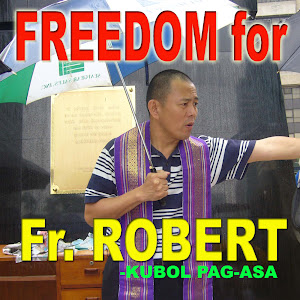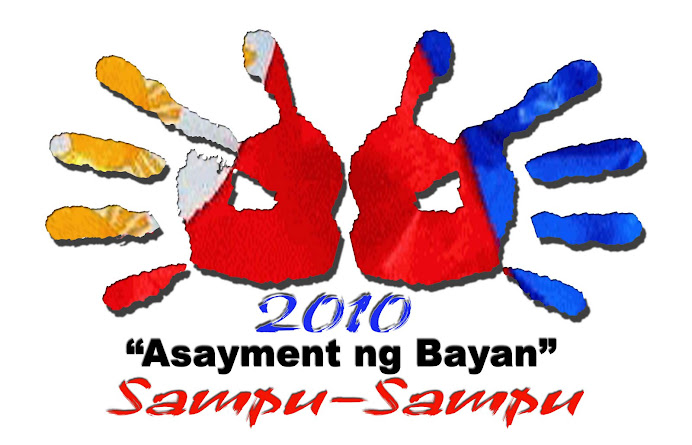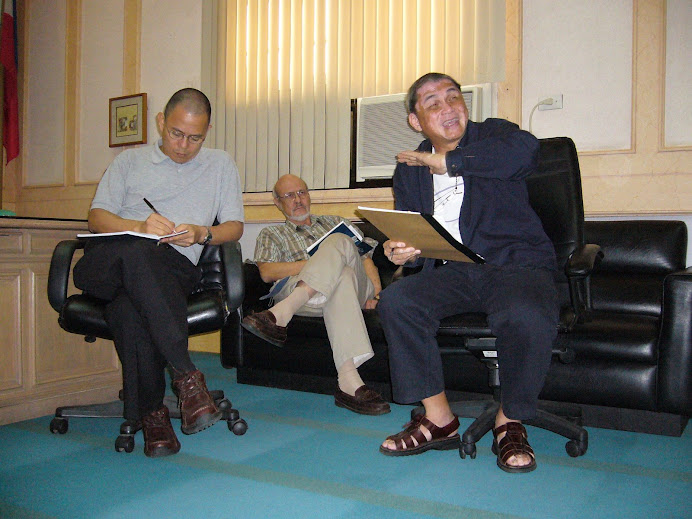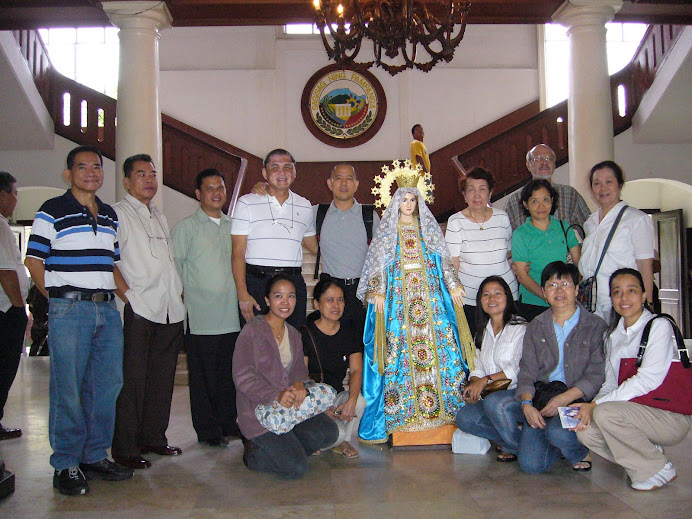Fr. Roberto P. Reyes
September 19 2007
Erap’s conviction last week did not produce the crowds for which the six thousand strong police force had been deployed around the Metropolis. Instead of thousands there were only six hundred who protested from an area several meters away from the Sandigang Bayan. The six hundred looked rather superfluous if not comical as they mounted their protest before a thick phalanx of policemen blocking the way between them and the Sandigang Bayan which was several meters away.
Contrary to the alarm sounded by those from various sectors, from media to business, from the competing camps and the church, there was no build up of protest. The bland turn out of protesters reminds me of a parallel situation where somebody ruins my enthusiasm to watch a movie by blurting out the ending or the movie’s climax. People are not only cynical when they say, it’s all in the bag. Politics in the Philippines has become too predictable and obvious that it no longer excites . Erap’s conviction in a way may be considered a triumph of justice but the moves that will emanate from either camps are something else. Normally upon conviction, a criminal is immediately led to his cell in a regular Philippine prison, in New Bilibid Prison in Muntinlupa for instance. Instead Erap is brought back to the comforts of his Tanay mansion, a move justified by political leaders like Senator Juan Ponce Enrile and Senator Francis Pangilinan as a way of avoiding Erap’s humiliation. (cf. Philippine Daily Inquirer, September 13, 2007)
Is genuine justice at work on the Erap case? Why worry about Erap’s feelings, his humiliation in particular. Isn’t humiliation a necessary if not a directly intended consequence of crime and its punishment?
Days before the Sandigang Bayan decision to convict Erap, posters with a picture of Cardinal Gaudencio Rosales of Manila were being circulated by women supporters of President Gloria Macapagal Arroyo. There were no quotations from the Cardinal only his picture. The statement printed on the poster with the Cardinal’s picture came from Gloria’s ladies. But the Cardinal’s picture though unaccompanied with his words was obviously used by Gloria’s women to legitimize their pro-Gloria message before Erap’s conviction. Yet days earlier, Cardinal Rosales made his own statement worth quoting here, “Kung ako ay mabait, sa kalsada ba pinatutunayan yan o sa mismong bahay? Kaya kung meron tayong batas na nagsisiyasat sa katiwalian ng isang tao, sibilyan, o namumuno, dapat siguro, dapat yata igalang natin yun ( For example, if I am a good person, is that proven in the streets or how I live my life? So if we have a law that will investigate the illegal acts of a person or official, then we should respect it.) Rosales said it was time Filipinos obeyed the laws and not flock to the streets whenever they disagreed with a decision or policy. He asked the laity to remain sober during these times since Erap’s plunder case was beyond politics, rather it was a case of morality.” (cf. Philippine Daily Inquirer, September 3, 2007)
Cardinal Rosales being a church leader has good reason to insist on morality yet is there such a thing as “pure morality” with nothing to do with politics or others aspects of life. Besides in the Philippines where almost ninety per cent are Catholics, do high church officials play a purely moral and spiritual role? Is it then a purely moral appeal to ask people to keep off the streets and obey the laws instead of taking to the streets to protest a decision or policy they disagree with? While one should not display his or her holiness on the street, but streets remain an important venue and symbol of democracy, in fact the last remaining recourse for the marginalized and disadvantaged poor? I remember listening to lectures about and against the dangers of “privatistic faith” when I was a seminarian. I am afraid that I hear more than subtle hints of privatism here.
Then a few days after Erap’s conviction and sentence were promulgated, Cardinal Ricardo Vidal of Cebu makes an appeal for Erap’s pardon. The Cardinal, a close friend of Erap said, “Whatever the administration will do later on, let us hope it will be pardon.” (cf. Cebu Daily News, September 14 2007)
In Philippine politics, it is impossible for high church officials not to encounter their counterparts in Government. In the process a good number of them become friends. It is quite clear which Cardinal is a friend of which President. Now going back to the bone of contention, whether “pure morality” sans politics exists? Another reality may seem to muddle the issue but does it? I am talking about friendship. Should there be a clean divide between friendship and morality or friendship and politics? I have my answer and surely you also have yours because we are Filipinos….
September 19 2007
Erap’s conviction last week did not produce the crowds for which the six thousand strong police force had been deployed around the Metropolis. Instead of thousands there were only six hundred who protested from an area several meters away from the Sandigang Bayan. The six hundred looked rather superfluous if not comical as they mounted their protest before a thick phalanx of policemen blocking the way between them and the Sandigang Bayan which was several meters away.
Contrary to the alarm sounded by those from various sectors, from media to business, from the competing camps and the church, there was no build up of protest. The bland turn out of protesters reminds me of a parallel situation where somebody ruins my enthusiasm to watch a movie by blurting out the ending or the movie’s climax. People are not only cynical when they say, it’s all in the bag. Politics in the Philippines has become too predictable and obvious that it no longer excites . Erap’s conviction in a way may be considered a triumph of justice but the moves that will emanate from either camps are something else. Normally upon conviction, a criminal is immediately led to his cell in a regular Philippine prison, in New Bilibid Prison in Muntinlupa for instance. Instead Erap is brought back to the comforts of his Tanay mansion, a move justified by political leaders like Senator Juan Ponce Enrile and Senator Francis Pangilinan as a way of avoiding Erap’s humiliation. (cf. Philippine Daily Inquirer, September 13, 2007)
Is genuine justice at work on the Erap case? Why worry about Erap’s feelings, his humiliation in particular. Isn’t humiliation a necessary if not a directly intended consequence of crime and its punishment?
Days before the Sandigang Bayan decision to convict Erap, posters with a picture of Cardinal Gaudencio Rosales of Manila were being circulated by women supporters of President Gloria Macapagal Arroyo. There were no quotations from the Cardinal only his picture. The statement printed on the poster with the Cardinal’s picture came from Gloria’s ladies. But the Cardinal’s picture though unaccompanied with his words was obviously used by Gloria’s women to legitimize their pro-Gloria message before Erap’s conviction. Yet days earlier, Cardinal Rosales made his own statement worth quoting here, “Kung ako ay mabait, sa kalsada ba pinatutunayan yan o sa mismong bahay? Kaya kung meron tayong batas na nagsisiyasat sa katiwalian ng isang tao, sibilyan, o namumuno, dapat siguro, dapat yata igalang natin yun ( For example, if I am a good person, is that proven in the streets or how I live my life? So if we have a law that will investigate the illegal acts of a person or official, then we should respect it.) Rosales said it was time Filipinos obeyed the laws and not flock to the streets whenever they disagreed with a decision or policy. He asked the laity to remain sober during these times since Erap’s plunder case was beyond politics, rather it was a case of morality.” (cf. Philippine Daily Inquirer, September 3, 2007)
Cardinal Rosales being a church leader has good reason to insist on morality yet is there such a thing as “pure morality” with nothing to do with politics or others aspects of life. Besides in the Philippines where almost ninety per cent are Catholics, do high church officials play a purely moral and spiritual role? Is it then a purely moral appeal to ask people to keep off the streets and obey the laws instead of taking to the streets to protest a decision or policy they disagree with? While one should not display his or her holiness on the street, but streets remain an important venue and symbol of democracy, in fact the last remaining recourse for the marginalized and disadvantaged poor? I remember listening to lectures about and against the dangers of “privatistic faith” when I was a seminarian. I am afraid that I hear more than subtle hints of privatism here.
Then a few days after Erap’s conviction and sentence were promulgated, Cardinal Ricardo Vidal of Cebu makes an appeal for Erap’s pardon. The Cardinal, a close friend of Erap said, “Whatever the administration will do later on, let us hope it will be pardon.” (cf. Cebu Daily News, September 14 2007)
In Philippine politics, it is impossible for high church officials not to encounter their counterparts in Government. In the process a good number of them become friends. It is quite clear which Cardinal is a friend of which President. Now going back to the bone of contention, whether “pure morality” sans politics exists? Another reality may seem to muddle the issue but does it? I am talking about friendship. Should there be a clean divide between friendship and morality or friendship and politics? I have my answer and surely you also have yours because we are Filipinos….
+tarp+Fr.+Robert+3++copy.jpg)
+tarp+Fr.+Robert+2+copy.jpg)




































No comments:
Post a Comment